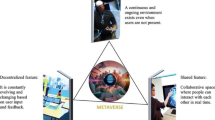Abstract
A bottleneck in gathering big data about learning is instrumentation designed to record data about processes students use to learn and information on which those processes operate. The software system nStudy fills this gap. nStudy is an extension to the Chrome web browser plus a server side database for logged trace data plus peripheral modules that analyze trace data and assemble web pages as learning analytics. Students can use nStudy anywhere they connect to the internet. Every event related to creating, modifying, reviewing, linking and organizing information artifacts is logged in fine grain with a time stamp. These data fully trace information students operate on and how they operate on it. Ambient big data about studying gathered au naturel can be tailored by configuring several of nStudy’s features. Thus the system can be used to gather data across a wide range lab studies and field trials designed to test a range of models and theories.

Similar content being viewed by others
References
Bisra, K., Liu, Q., Salimi, F., Nesbit, J. C., & Winne, P. H. (2016). Inducing self-explanation: A meta-analysis. Manuscript submitted for publication.
Fritz, C. O., Morris, P. E., Crowther, V.-L. & Benn, N. (2014). The influence of early questions on learning from text. In 55th Annual Meeting of the Psychonomic Society, Long Beach, California.
Ma, W., Adesope, O. O., Nesbit, J. C., & Liu, Q. (2014). Intelligent tutoring systems and learning outcomes: A meta-analysis. Journal of Educational Psychology, 106(4), 901–918.
Marzouk, Z., Rakovic, M., Liaqat, A., Vytasek, J. Samadi, D., Stewart-Alonso, J., Ram, I., Woloshen, S., Winne, P. H., & Nesbit, J. C. (2016). What if learning analytics were based on learning science? Australasian Journal of Educational Technology, 32(6), 1–18.
Odilinye, L., Popowich, F., Zhang, E., Nesbit, J.C., & Winne, P. H. (2015). Aligning automatically generated questions to instructor goals and learner behaviour. In Proceedings of the 2015 IEEE International Conference on Semantic Computing (pp. 216–223). ICSC 2015: Anaheim, CA
Roll, I., & Winne, P. H. (2015). Understanding, evaluating, and supporting self-regulated learning using learning analytics. Journal of Learning Analytics, 2(1), 7–12.
Winne, P. H. (2006). How software technologies can improve research on learning and bolster school reform. Educational Psychologist, 41, 5–17.
Winne, P. H. (2013). Self-regulated learning engines: Software technologies for researching and promoting self-regulated learning. In R. Luckin, S. Puntambekar, P. Goodyear, B. Grabowski, J. Underwood, & N. Winters (Eds.), Handbook of design in educational technology (pp. 482–491). New York: Routledge.
Winne, P. H. (2017a). Learning analytics for self-regulated learning. In C. Lang, G. Siemens, A. Wise, & D. Gaševć (Eds.), Handbook of learning analytics (pp. 241–249). Beaumont: Society for Learning Analytics Research.
Winne, P. H. (2017b). Leveraging big data to help each learner upgrade learning and accelerate learning science. Teachers College Record, 119(3), 1–24.
Winne, P. H. (in press). Enhancing self-regulated learning for information problem solving with ambient big data gathered by nStudy. In O. O. Adesope, A. G. Rud (Eds.), Contemporary technologies in education: Maximizing student engagement, motivation, and learning. New York: Palgrave Macmillan.
Winne, P. H., Vytasek, J. M., Patzak, A., Rakovic, M., Marzouk, Z., Pakdaman-Savoji, A., Ram, I., Samadi, D., Lin, M. P. C., Liu, A., Liaqat, A., Nashaat, N., Mozaffari, Z., Stewart-Alonso, J., & Nesbit, J. C. (2017). Designs for learning analytics to support information problem solving. In J. Buder & F. W. Hesse (Eds.) Informational environments: Effects of use, effective designs. New York, NY: Springer.
Acknowledgements
This research was supported by grants from the Social Sciences and Humanities Research Council of Canada.
Author information
Authors and Affiliations
Corresponding author
Rights and permissions
About this article
Cite this article
Winne, P.H., Nesbit, J.C. & Popowich, F. nStudy: A System for Researching Information Problem Solving. Tech Know Learn 22, 369–376 (2017). https://doi.org/10.1007/s10758-017-9327-y
Published:
Issue Date:
DOI: https://doi.org/10.1007/s10758-017-9327-y




